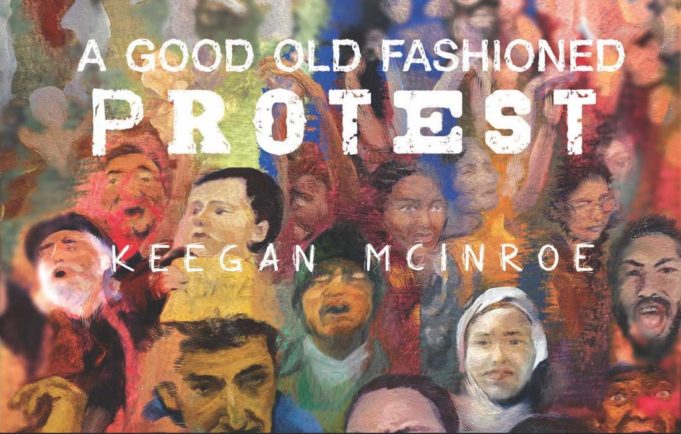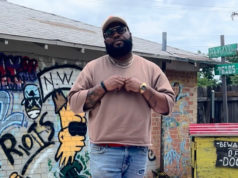Here’s my philosophy: “Wherever you are, there you are.” I know that quote is supposed to read “wherever you go… ,” but every moment you’ve ever experienced is culminating in the moment you’re experiencing right now. Every choice you’ve ever made (getting married at 22 or not, going swimming right after eating a chili dog or not) has led you to reading this column right now. What’s more, if you think that everything happens for a reason, then whatever you do or don’t do will result in what was supposed to happen anyway. That’s the best way I can describe why I have put off listening to Keegan McInroe’s new album until now.
McInroe is an itinerant folk singer who divides his time between Texas and Europe on a regular basis. Earlier this year, he was home long enough to record A Good Old Fashioned Protest with Taylor Tatsch at Audiostyles in Austin. It debuted in April –– I guess I’ve been sitting on it for longer than I realized.
I’d planned to digest the album on Sunday, presumably in my headphones while walking off brunch, except I didn’t go to brunch. It seemed like the wrong thing to do after 26 people were murdered in a church that morning. I didn’t listen to it that night either because I went to MASS to watch pastor Jay Bakker and comic Kristen Becker (as well as comics Meghan Deponceau and Sarah Rose Marie) talk about bringing people together based on our shared humanity, in spite of our differences and enmities. Becker also told jokes about fisting, which brought people together with laughter.
On Monday, I tried to make sense of shit, distracting myself with a long walk and a deep dive into Chick Corea’s Return to Forever albums –– it’s hard to think about the world when your brain is occupied with busy, spacey jazz fusion, so A Good Old Fashioned Protest continued to wait.
I finally got around to the record on Tuesday, after I’d processed the news that one TCU shuttle bus driver had shot at another TCU shuttle bus driver in a fit of road rage that morning. I got out of bed and put on coffee, finally pulling up Protest while I heated up some oatmeal.
I think that was the right moment to hear McInroe’s songs. I don’t really like folk music, and I didn’t want to digest protest songs by McInroe or anybody else, in the way that I would rather eat chilaquiles at Fuzzy’s than boil roughage in my own kitchen. But in the wake of Sunday’s mass murder and Tuesday morning’s bout of gun violence, protest music was what I needed to hear. There was also a deadline I was blowing, but whatever. Wherever you are, there you are, right?
McInroe’s songs are funny, cynical, and clever, while Tatsch’s production is tasteful and spare, which is important to note: McInroe’s words deserve to be unburdened by distraction. If you’re dismayed that America’s violent absurdism is now the new norm, you need to listen to them. Some of the lyrics are on the nose. But why beat around the bush when it comes to a message of love? On the third track, McInroe observes that bombing for peace is like oil spills for purity and fucking for virginity. He’s right, of course, and I wondered if the powers that be ever think about that while ordering airstrikes. The following track is called “Christmas 1914,” about a WWI soldier who “just met a boy they want me to kill.” I felt myself tearing up. Lots of people know the story about the Christmas Truces of 1914 in the first Great War, but who’s every really thought about it? McInroe has, obviously. He’s also considered what it’s like when American bombs fall on a terrorist’s neighborhood –– getting the bad guy while killing a bunch of innocents. That’s in a song called the “The Ballad of Timmy Johnson,” which flips the script, placing the carnage on American soil. That one hit me hard, too.
I needed to hear these songs, because whether it’s 26 people shot while praying in a church or 500 while watching Jason Aldean in Las Vegas, or one person driving a bus, I needed to remember that this country is fucked up and that gun violence shouldn’t be a normalized like a hurricane or forest fire. Wherever you are, there you are. I’m here. And I’m trying to be present to everything that means.












